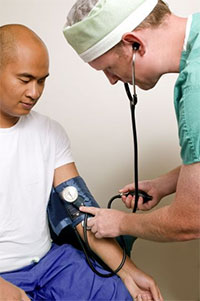 At Northway Medical Associates, we understand the importance of personalized preventative care. One of the most effective methods is seeing your doctor for an annual physical exam, also known simply as a “physical.” Regular visits can help spot potential problems before they get serious, and maintaining a steady relationship with your doctor will allow them to keep an eye on what’s going on with your health, especially if you have a health concern that requires consistent tracking. However, every patient is different, and there are multiple factors that affect your own schedule for a routine physical. Here are a few guidelines that we recommend our patients to follow.
At Northway Medical Associates, we understand the importance of personalized preventative care. One of the most effective methods is seeing your doctor for an annual physical exam, also known simply as a “physical.” Regular visits can help spot potential problems before they get serious, and maintaining a steady relationship with your doctor will allow them to keep an eye on what’s going on with your health, especially if you have a health concern that requires consistent tracking. However, every patient is different, and there are multiple factors that affect your own schedule for a routine physical. Here are a few guidelines that we recommend our patients to follow.
The Basics of Getting a Physical
Generally, we recommend that our patients come in for a routine physical once a year. The examination usually begins with a conversation, which will be an opportunity for you to share any concerns about your current health. It is also a chance for the doctor to learn more about your current and past medical history, and he or she will likely inquire about your current lifestyle, including exercise habits, sexual health, diet, smoking, and alcohol/drug use. It’s a lot of information, but this will help us get a feel for your overall health and identify any potential health problems.
Here are some of the basic vitals your doctor should check at every visit:
- Blood pressure
- Heart rate
- Respiration (breathing) rate
- Temperature
- Vaccination history
Your doctor may also order you to take a laboratory test at a later time in addition to your physical. Most of these tests are routine, such as complete blood count, chemistry panel, urinalysis, and diabetes tests.
Gender-Specific Physicals
Annual physicals take on an important role in prevention. There are physicals that are recommended for men and women, especially as you age.
Physical for Women
 A woman’s annual physical should include the following tests for:
A woman’s annual physical should include the following tests for:
Breast cancer: The doctor will feel for abnormal lumps, which could indicate cancer or benign breast conditions. Age 40 is where doctors recommend women begin annual mammogram screenings for breast cancer.
Pelvic exams: This allows for examination of the vulva, vagina, cervix, uterus, and ovaries. The doctor will check for sexually transmitted infections, and additional tests like a Pap smear and HPV test are important in screening for cervical cancer.
Bone density: According to the National Osteoporosis Foundation, of the estimated 10 million Americans with osteoporosis, or bone loss, about eight million (80%) are women. When a woman reaches menopause, the drop in estrogen levels can lead to bone loss. Bone density tests are recommended for postmenopausal women (and men) age 50 and older, and these tests are how osteoporosis is diagnosed in older individuals.
Physical for Men
 Men should get checked every year for the following:
Men should get checked every year for the following:
Testicular exam: Any lumps, tenderness, or changes in size can be signs of testicular cancer. Most men notice a growth themselves even before they see a doctor.
Hernia exam: Also known as the “turn your head and cough” test, this exam checks for any weakness in the abdominal wall between the intestines and scrotum.
Prostate exam: Prostate cancer is the most common cancer type in men, but it is treatable if diagnosed early. Regular screenings once a year is the best way to detect it in time. A digital rectal exam (DRE) involves the doctor inserting a finger into the rectum to feel the prostate for its size and any abnormalities.
It’s Never Too Late To Get A Physical
If you have never undergone a physical examination, we would be happy to get you started. And if you aren’t sure whether or not you should be coming in, feel free to reach out to your Fulton and Baldwinsville family doctors. Our staff can answer any questions you may have!Contact us at our Fulton or Baldwinsville offices or fill out our online form to schedule an appointment.